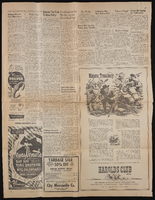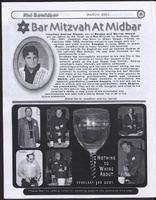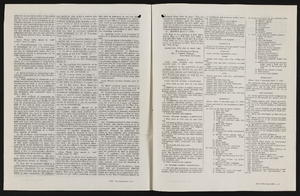Search the Special Collections and Archives Portal
Search Results

Jean Munson oral history interview: transcript
Date
Archival Collection
Description
Oral history interview with Jean Munson conducted by Vanessa Concepcion, Cecilia Winchell, and Stefani Evans on November 30, 2021 for Reflections: The Las Vegas Asian American and Pacific Islander Oral History Project. Jean discusses her childhood growing up in Guam, the nursing career path of her parents, and her decision to pursue an "unconventional path" as a comic book artist. She talks about her education at the University of Nevada, Las Vegas, her passion for the Asian American Pacific Islander (AAPI) community within Las Vegas, and her roles in community activism and leadership. Jean also shares her current pursuits as a podcaster of Bruha Baddies, co-owner and printer of Plot Twist Publishing, and co-founder of the Comic and Zines Festival.
Text

Sook-ja Kim, February 12, 1996 and April 6, 1996: transcript
Date
Archival Collection
Description
The Kim Sisters, composed of three sisters, Sook-ja, Ai-ja, and Mia, came from Korea to Las Vegas in February 1959. Their first contract in America was to perform at the Thunderbird Hotel for four weeks as part of the China Doll Revue, the main showroom program. This engagement led to a successful career. Their popularity reached was at its height at the end of the 1960s when they performed throughout the United States and Europe. Sook-ja Kim is the oldest of the sisters. After his sister Ai-ja died in 1987, Sook-ja teamed up with her two brothers and continued to perform until 1989. Now semi-retired from show business, with occasional performances in Korea, she is working as a real estate agent. In this interview, she talked about her childhood, her career, and the family she has built since coming to America. Sook-ja was born in 1941 in Seoul, Korea as the third child of seven in a musical family. Her father was a conductor and her mother, a popular singer. After the Korean War, her mother arranged to send the Kim Sisters to America. When they came to Las Vegas, there were virtually no Koreans in the area. They depended on each other to take care of themselves. Some of the difficulties they had to adjust to in American were language, food, and cultural differences. Over the span of almost forty years in America, Sook-ja became acculturated without discarding her ethnic identity of family priorities. Her life-long guiding principle has been to adopt certain American values while continuing to keep her cherished Korean ethnic values. Through their performances, the Kim Sister informed the audience about Koreans and their culture. As the oldest of the group, Sook-ja was entrusted the care of her sisters, and later her brothers, the Kim brothers. Once she settled in Las Vegas, she brought more than forty members of her extended family to the city, contributing to the growth of the Las Vegas Korean community.
Text
Howard Hughes Public Relations Reference Files
Identifier
Abstract
The Howard Hughes Public Relations Reference Files (1931-1997) were compiled by Richard "Dick" Hannah, vice-president of the Los Angeles public relations firm Carl Byoir & Associates, which was hired to direct public relations for Hughes’ companies. The collection is primarily composed of newspaper clippings organized into reference files. A significant number of the files contain articles about Howard Hughes’ personal life, the operations of his companies, and legal and political disputes involving Hughes and his companies. The files also document a range of other subjects related to his business ventures, including aviation, aerospace, defense industries, motion picture studios, film stars, communism in Hollywood, and the House on Un-American Activities Committee (HUAC). Later in life Hughes became obsessed with how he was being portrayed in the media. In addition to collecting magazine articles, newspaper clippings, transcripts, screenplays, and books that referenced him. He also collected newspaper clippings about the activities of print media outlets, columnists, radio-television stations, current and former employees, and competitors. The collection also contains newspaper clippings about Watergate, organized crime, gambling, and Las Vegas and contains press releases, correspondence and records generated by Carl Byoir & Associates as well as Rosemont Enterprise, Inc.
Archival Collection
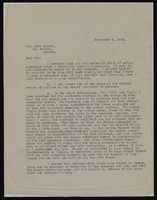
Correspondence, Thomas Toland to Levi Syphus
Date
Archival Collection
Description
Text
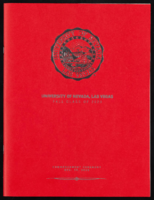
University of Nevada, Las Vegas (UNLV) Fall 2020 commencement program
Date
Archival Collection
Description
Commencement program from University of Nevada, Las Vegas Commencement Programs and Graduation Lists (UA-00115).
Text

Robin Greenspun oral history interview: transcript
Date
Archival Collection
Description
Oral history interview with Robin Greenspun conducted by Barbara Tabach on February 09, 2017 for the Southern Nevada Jewish Heritage Project. In this interview, Greenspun discusses her family background and growing up in Las Vegas, Nevada. She talks about her early interest in the arts, working in television productions, and becoming a film director.
Text

